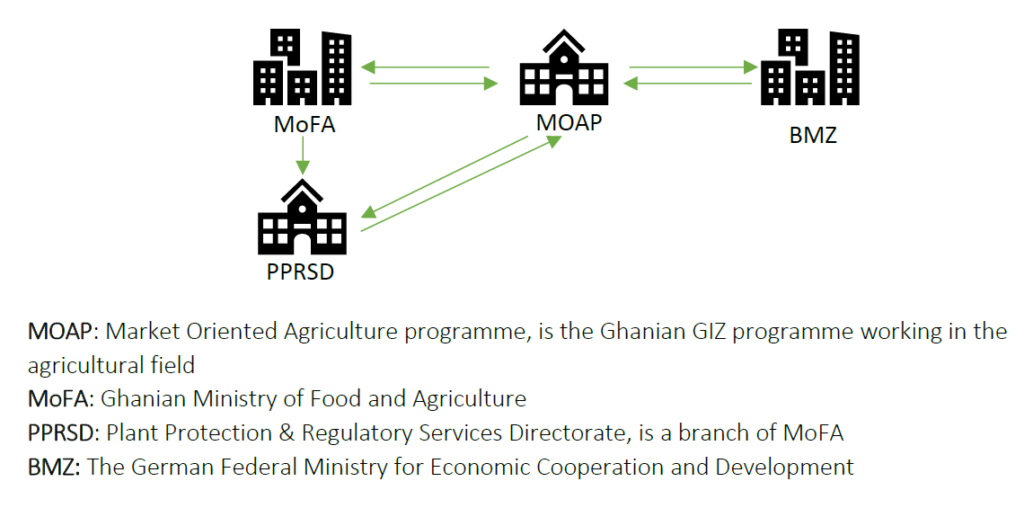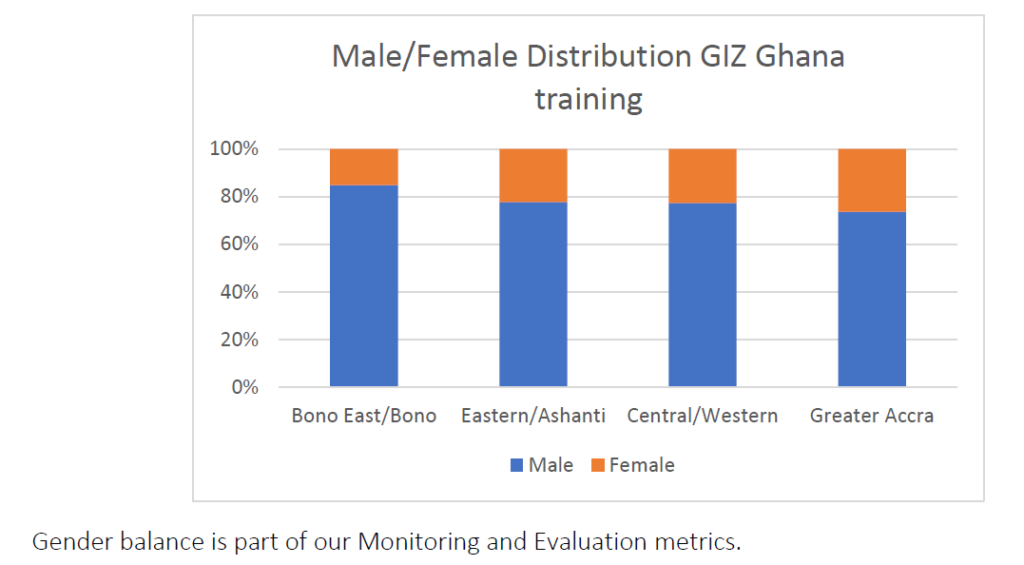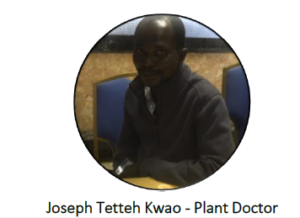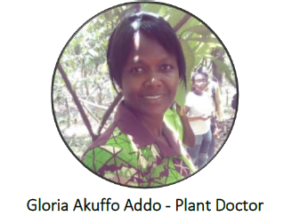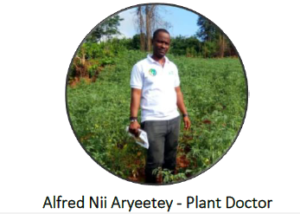Introduction
Market Oriented Agriculture programme (MOAP) in Ghana working on supporting the actors of the value chain. The aim of MOAP is to enhance quality agricultural production, increase income and create jobs along the value chains. The activities are starting with training of small holder farmers. Building capacity of extension agents and all relevant stakeholders done in collaboration with the Ghana government.
| Through our actions and interventions, we are aiming to achieve some SDGs like:
-No poverty (1) -Zero Hunger (2) -Gender Equality (5) -Climate action (13) |
-Life on Earth (15)
-Decent work and Economic growth (8) -Reduced inequality (10) |
MOAP is working in close collaboration with the Ghanaian Ministry of Food and Agriculture (MoFA)
and in the current application we are working with the Plant Protection & Regulatory Services
Directorate (PPRSD). The German Federal Ministry for Economic Cooperation and Development
(BMZ) is the commissioning party for MOAP.
Background
The Ghanaian agricultural sector constitutes about 70% of the population living in the rural areas.
farming is an activity carried out by men and women and both require improved technology for
efficient production and disease-free crops.
Women in Ghana makeup half of the total population and 47% of the farming labor force. They
process, market nearly all crop products and about 30% are heads of households. Yet the consensus is
that women are not recognized and appreciated in the agriculture sector.
Over the decades, there has been an increasing number of women going into farming.
In shared farms, meaning men and women working together on the fields, the revenues are often
distributed unequally between men and women. Men taking a bigger share of the income. This
unfortunate situation has been accepted by men and women.
The farm industry is mostly a men business this is probably 1 of the major cause of women being
discriminated in this industry.
Advisors often direct their attention to men mostly, depriving women of technical knowledge for production, information and assistance making men essential knowledge owners.
Extension agents tend to contact men more than women creating a gap. Extension service does not reach women hence creating a gender imbalance in the extension delivery in Ghana.
Our Approach
The Market Oriented Agriculture Programme (MOAP) works with all relevant stakeholders along the value chain for an inclusive, equitable and climate-smart approach to achieve our goals.
MOAP activities includes but are not limited to:
– Train and support capacity building of farmers provided by Department of Agriculture
– Enhance the capacities of the personnel of the Department of Agriculture in extension delivery
– Distribute technical knowledge to help serve Ghanaian farmer better
– Support the creation of plant clinics
The plant protection and regulatory services directorate (PPRSD) is a directorate under MoFa which is in charge of plant health in the country; thus, plant quarantine, pest and disease control as well as fertilizer and pesticide monitoring and regulation. PPRSD is also holding knowledge on good practices and national/international standard.
The current strategy used to spread out the information is to use Agriculture Extension Agents (AEAs).
Extension Agents activities are:
– Farm visit
To ensure that the farmer is carrying the adequate activities on the farm such as farm sanitation, spraying routines…
– Farmer’s home visit
To educate farmers on nutrition and new technologies on improved agriculture such as pruning, pesticide effects…
– Writing reports on the activities that were carried out
MOAP identified that extension services, used to advise farmers on best practices, in the country was poor around 1 extension agent for around 1000 farmers. This ratio meant there was a huge gap in the extension delivery and also to address the imbalance in the extension delivery, MOAP partnered with the Centre for Agricultural Biosciences International (CABI) in its Plantwise programme to train and build the capacity of AEAs both men and women to become plant doctors who will run a mobile plant clinic on regular basis.
Plant doctors
– Public plant clinic sessions
Setup mobile clinic on a regularly basis where farmers can request for advice on pest and disease. They often bring affected plant sample to be inspected by the plant doctor.
The plant doctor is providing recommendations on how to fight the pest or disease.
– Farm visit follow up
They ensure that the treatment has successfully eradicated the pest or disease.
Our approach to tackle the gender unbalance is to motivate women to apply for farm industry jobs and support female entrepreneur.
The technical advises provided by MOAP had as direct impact:
– Increase yields and income by the introduction of Plantwise bringing a better plant health management;
– Support the development of PPRSD by providing equipment to help reduce losses on the fields due to pest and diseases management;
– Strengthening the linkage and coordination between health system stakeholders: MoFA, PPRSD, fertilizer dealers, seeds provider, pesticide dealers…
– Detection of new pests by the introduction of Plantwise such as fall anyworm;
– Increase the gender balance by promoting female in the industry and support female entrepreneur
Gender as a quality feature of our work
MOAP is never willing to force on their world vision; while our group and the programme group is convinced that a favorable work environment requires gender balance, we made sure the vision of gender balanced is shared with our stakeholders.
To ensure the vision is shared we conducted interviews with 4 members of the plant clinic staff (2 men and 1 woman, see Annex 1 for more details). The outcome of this interview is that the workforce in the field is constituted of mostly men. They all recognized that having balance among the staff would be beneficial for the work.
MoFA, MOAP and PPRSD are all handled by women, as woman they all recognize that an effort is needed to empower women in the field. Recently a new female Country Director took over the responsibility for GIZ Ghana.
MoFA has recognized that the balance should be improved, their immediate action is to add note on application to encourage women to apply for jobs.
On our hand, MOAP is always requesting to have at least 20% of women present during capacity building sessions and training, this ensure the part of woman involved in the field is not decreasing.
Gender and result-based monitoring
Youth and women are the core of our interventions and hence when trainings and capacity buildings are organized for farmers, we separate the number women farmer and male farmers that participated in training.
Data collected is analyzed and summarized into the percentages of the various gender. Gender-based discrimination is documented in MOAP. The results in areas of gender equality are systematically recorded and they reflect in our quarterly and yearly reports written and shared with our stakeholders and partners. Through our monitoring, we realized that the number of women who make themselves available to receive extension services was very minimal and the number of men was twice the number of women.
Some of the challenges we are facing is that representation of women in the numbers are lower and we are working to improve the numbers. In the Ghanaian context, man is often the head of the householder, this translate in female farmers being registered under their husbands.
Cooperation
As stated above, MOAP does not work in isolation. In fact, our interventions are implemented by our partners and stakeholders. Gender equality cannot be achieved individually and hence we had to first sensitize our stakeholders and partners about its importance and also as an integral part of GIZ operations. MOAP made it a requirement and an obligation on the side of our partners and stakeholders to add at least 20% women whenever MOAP has to sponsor trainings and capacity building activities in the various MOAP operational areas.
Challenges
– Most women where not employed in the field making it difficult to get them to participate in trainings.
– Women could not make the time for these services due to house chores
– Husbands did not allow their wives to travel to the fields for days
Success Factors
– Sensitize the big players in the game;
– Signing Memorandum of Understanding between the District of Agriculture, the off taker and the farmer;
– Creating the needed environment that allow women to work; thus, pregnant and breastfeeding mothers.
Other success stories
– Croms: MOAP is supporting a female entrepreneur producing organic tea involving 15 full time employees. To empower women she also involves 800 women for chia butter production;
– Eden Tree: MOAP is supporting a successful farm industry owned by women.
Conclusion
Our Programme and our stakeholders are currently aware of the gender unbalance, they are now also convinced that this situation should not remain as it is.
With gender being a strong focus from MOAP, we monitor, initiate and support measures to ensure gender balance along the value chain.
In your field are there a majority of man or woman? Majority of men
Do you see it as a strength? NO
Would it be better if balanced the other way around? YES should be balanced
How to achieve balance? Balance can be achieved through
• More Education to change the mind set of females especially in Ghana.
• More Motivation (During farmers day celebration).
• Support and empowerment for female farmers.
• Formation of more female farmer groups, since the male shadow them when its mix.
As an essential part of the information channel, how do you choose the target farmer?
• Those that call on me for assistance.
• Committed and willing individuals and groups.
• Starters or Beginners.
• Finally, those I can reached out to either called upon or not through fora and plant clinic sessions.
Do you know that 50% of the farmers are women yet only xx% are reached by RA? YES, it’s could more than 50% and the 12%reached is true.
According to you what could be the reason?
• Most women don’t call on me (officer) for assistance although they might need it.
• Most males see farming as business but less in females.
• Plenty household duties makes them occupied to even attend farmer forum and educational
• gatherings.
• Even those who make it to the fora’s can’t voice their issues out since their husbands are present.
In your field are there a majority of man or woman? men
Do you see it as a strength? It’s a weakness
Would it be better if balanced the other way around? much better if women are more on my field
How to achieve balance? Encouraging women and recruiting women in to those fields
As an essential part of the information channel, how do you choose the target farmer? I personally chose women groups
Do you know that 50% of the farmers are women yet only xx% are reached by RA? Yes and very true
According to you what could be the reason? cultural barriers and also lack confidence in our rural women
In your field are there a majority of man or woman? Men ( twice the number of women)
Do you see it as a strenght? I don’t see it as a strength
Would it be better if balanced the other way around? I don’t think it would be better either ways. Both men and women should do their activities and achieve their results. It should be equally balanced.
How to achieve balance? Women should be encouraged to take agriculture as a profession.
Local government should give slots to women when employing
Competence based training for both gender
Motivation in the form of incentives to create work friendly environment
As an essential part of the information channel, how do you choose the target farmer? Community announcements Women are mostly in the kitchen when I go for home visits Men are easily accessible Women prefer their husbands to receive extension services on their behalf *Husbands manage the farms of the women
Do you know that 50% of the farmers are women yet only xx% are reached by RA? 6% receive extension services
According to you what could be the reason? Women who manage their own farms receive extension services • Those married who do not own farms feel extension services is for men who manage the farm.

 GIZ Gender Website
GIZ Gender Website